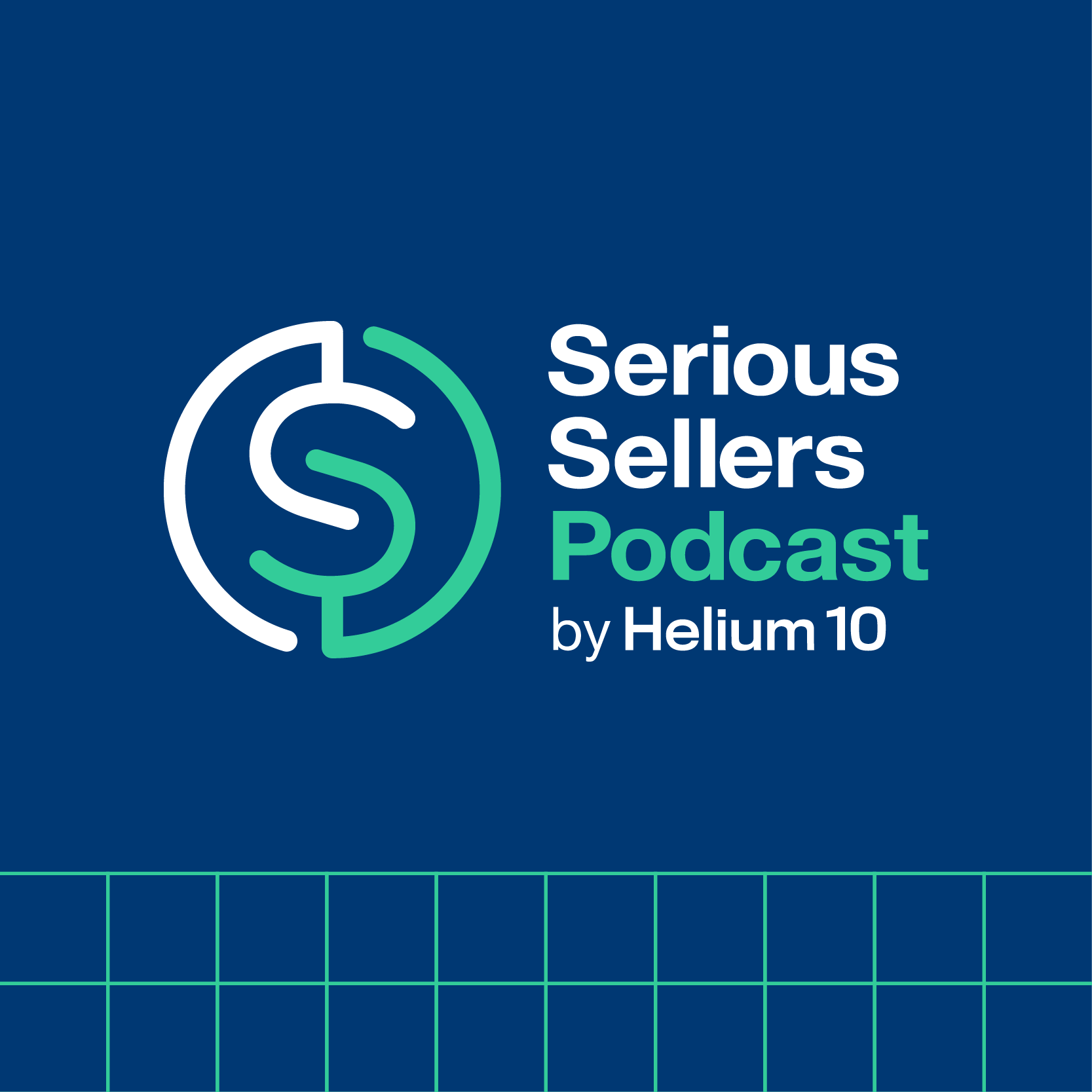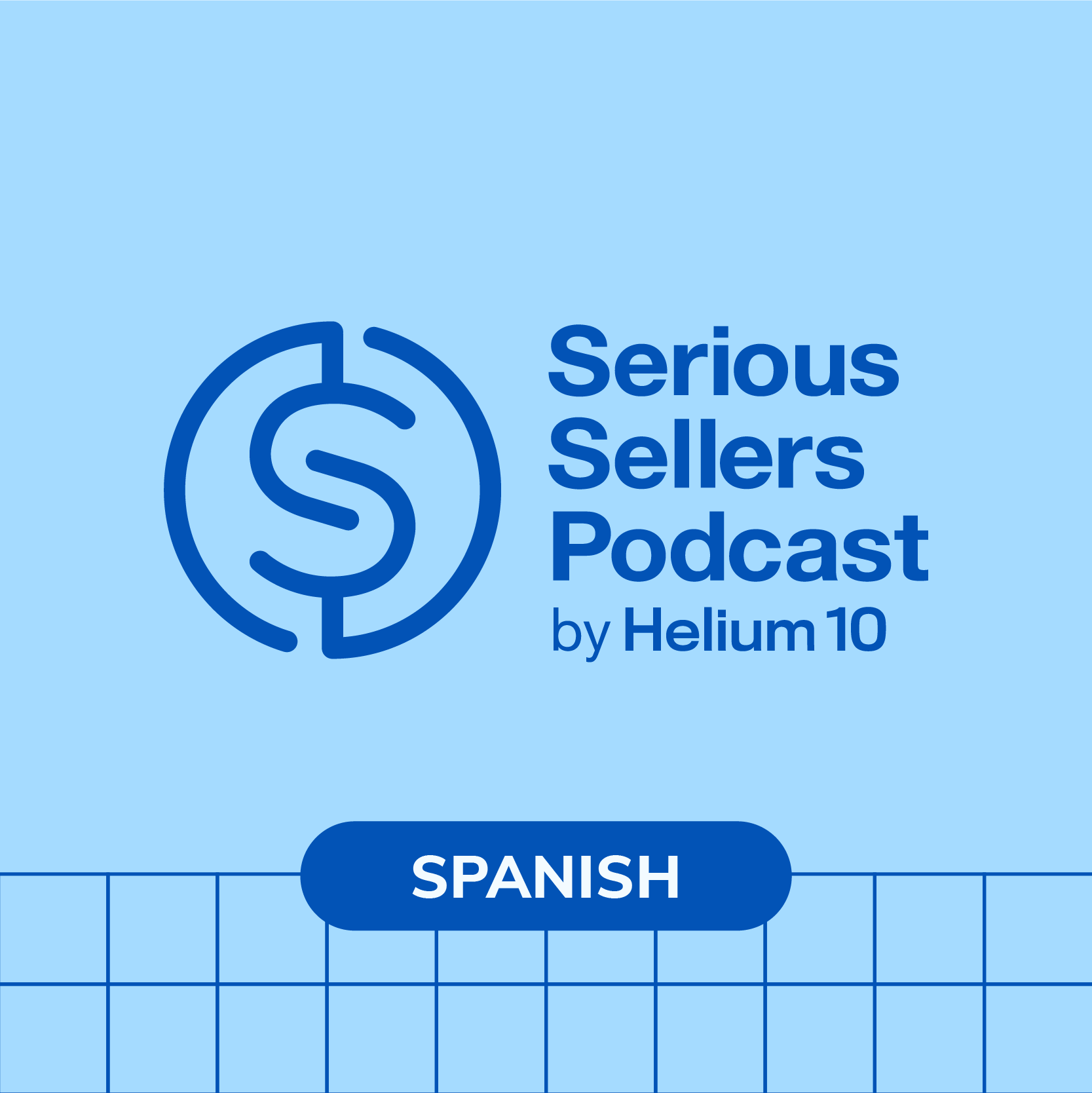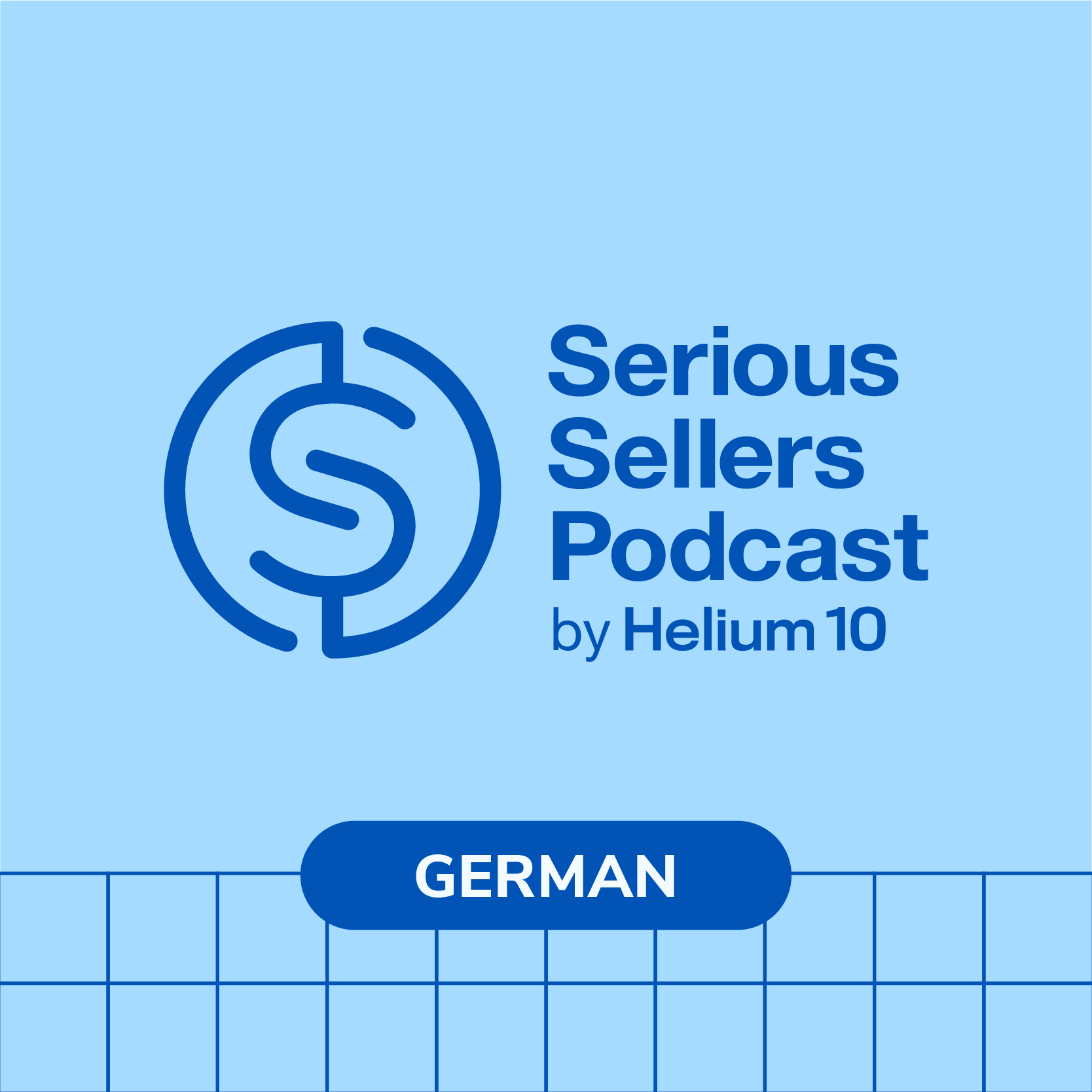Episode 58 – Learn the Amazon Keyword Research Tips of the Pros

Do you spend too much time thinking about how to please a very important machine? Well, you’re not alone. In today’s episode of the Serious Seller Podcast, Helium 10’s Director of Training and Customer Satisfaction, Bradley Sutton offers a mini-workshop focusing on using Amazon keyword research to keep both Amazon’s algorithm and your buyers equally happy. You need them both, and here’s how to use cutting-edge keyword strategy to make it happen.
In episode 58 of the Serious Sellers Podcast, Bradley discusses:
- 01:10 – Clearing Up A Few Misconceptions
- 02:00 – First, Let’s Make Sure That the Machine is Happy
- 03:30 – But, it’s a Real Live Customer Who is Going to Actually Buy Your Product
- 06:03 – How to Find Your Buyer Relevant Keywords?
- 07:42 – Keywords are the Number One Driver of Sales
- 09:08 – Multiple Matching Products + Page One + Cerebro = Great Keywords
- 14:03 – Your Competitor’s Ranking Keywords – Half Right, But A Very Important Half
- 15:19 – There’s Just Not Enough Space to Put All Your Keywords in Phrase Form
- 17:32 – Bradley’s 2 Hour Keyword Workshop – www.keywordresearchnow.com
- 18:40 – Number One, Your Product’s Keywords Need to be Relevant to Your Buyer
- 18:55 – And, You Still Need to Keep the Machine Happy
Enjoy this episode? Be sure to check out our previous episodes for even more content to propel you to Amazon FBA Seller success! And don’t forget to “Like” our Facebook page and subscribe to the podcast on iTunes, Google Play or wherever you listen to our podcast.
Want to absolutely start crushing it on Amazon? Here are few carefully curated resources to get you started:
- Freedom Ticket: Taught by Amazon thought leader Kevin King, get A-Z Amazon strategies and techniques for establishing and solidifying your business.
- Ultimate Resource Guide: Discover the best tools and services to help you dominate on Amazon.
- Helium 10: 20+ software tools to boost your entire sales pipeline from product research to customer communication and Amazon refund automation. Make running a successful Amazon business easier with better data and insights. See what our customers have to say.
- Helium 10 Chrome Extension: Verify your Amazon product idea and validate how lucrative it can be with over a dozen data metrics and profitability estimation.
- SellerTradmarks.com: Trademarks are vital for protecting your Amazon brand from hijackers, and sellertrademarks.com provides a streamlined process for helping you get one.
Transcript
Bradley Sutton: On today’s episode, I’m going to go in-depth with you guys and give you a mini keyword workshop tutorial. Find out some great strategies to find the most important keywords for your next Amazon listing.
Bradley Sutton: How’s it going, everybody? Welcome to another episode of the Serious Sellers Podcast. I am your host, Bradley Sutton, and today we’re going to do a little keyword research mini-workshop. All right? A lot of you guys are wondering, “How do I find the best keywords for my listing? I already picked my product. I know what I’m going to sell. Maybe I even have the product on order from China. What are the next steps?” That’s what we’re going to go over today. And before I do that, we’ve got to make sure that you guys are in the right mindset, because there’s so much misinformation out there. It makes me mad. I’ve talked about it on other episodes and on the AMS and things, but people are being misguided. That’s the bottom line—they are misguided by other companies, by gurus, by people who say that they know when they’re talking about and they don’t.
Bradley Sutton: And so, we need to clear up a few misconceptions. First of all, remember that there are different aspects of keywords or keyword research that makes it important. First of all, why are keywords even important? Well, remember on Amazon, if you’re new, you’ve got to understand that that is the way that people can find your product. If people search for a keyword and your listing doesn’t have that keyword, your listing is not going to come up in the search results. And that means nobody’s going to find your product— the people who are searching for that keyword—and you’re not going to make a sale. So you’ve got to have the right keywords there in your listing, the ones that give you the best chance to make sales for your product. There are different aspects of importance, I guess you can say, about keywords in the first place.
Bradley Sutton: Number one, you’ve got to make the machine happy as Brock Johnson says or make Amazon happy. Amazon has an algorithm, they determine, hey what even is an important keyword for this listing. And if they don’t think that this your keyword is relevant at all or important at all to your listing because of your category or something; the bottom line is they’re not going to index yours. They’re not going to make you searchable. They’re not even going to relate that keyword to your listing—you could be in the category of notebooks or something like that and maybe your notebook is the very first of its kind that has a laser pointer on it. Well, it might be very relevant, very accurate to your product that you use the word “laser pointer” on your title, like a new notebook with a laser pointer. But guess what?
Bradley Sutton: If you’re in the stationery category, I would probably guarantee that Amazon is not going to automatically index you or make you searchable for that keyword “laser pointer” because in their mind “laser pointer” has no relevance at all to the category of stationary even though it accurately describes your product. That’s an important thing. You do have to make sure that you understand what Amazon wants for your listing. And, sometimes, you might have to open up a case for them to explain if they’re not indexing you, why you should be indexed. But a lot of sellers stop right there. All they want to know is what is relevant to Amazon. And that’s what’s the most important. What’s going to make Amazon happy? What do they think is necessary? It does have some importance, right? But guys, that is not the end of it.
Bradley Sutton: At the end of the day, it’s a customer. It’s a buyer who is going to buy your product, not the Amazon algorithm. So do not forget that the relevancy that is most important, is the relevancy to the buyer. At the end of the day, that is the most important. How do you know what is relevant either to Amazon or the buyer? Well, you’ve got to be so careful out there guys. There are companies who make up metrics and they say, “Hey, use this metric, and this is what means it’s relevant to Amazon.” The classic example I’ve used many times. It was so hilarious that when I was helping somebody launch a product, it was a facial toner product. I’m not sure what a facial toner does. I think it helps with the tone of your skin or something like that.
Bradley Sutton: Now, the keyword that one tool said was the most relevant for this. According to Amazon, this was according to that; it was saying that it was extrapolating Amazon’s relevancy. Amazon used to have some kind of relevancy score back in the day. All right, so according to Amazon, or I’m just believing that the tool had the tie into Amazon, I don’t remember if it did or not, but it said that Canon printer cartridge was 100% relevant to this product. Now why would it say that? Well, because printer cartridge and toner sometimes are the same thing. So, to Amazon’s algorithm, Canon printer cartridge was the number one most important word. Now, think about that. If you just take that information at face value, and you go try and rank on page one for Canon printer cartridge with your facial beauty toner, are you going to get any sales just because it’s a hundred percent relevant to Amazon?
Bradley Sutton: Of course not. So guys do not concentrate just on those kinds of metrics, but you’ve got to think about what is relevant to the buyer. There are certain other people out there who try and teach things like, “Hey, just use a certain number or a certain score and that’s what’s going to help you guys.” If you’re an Amazon buyer, think about it. Those of you driving in your car right now or listening on your iPad, think about the last thing that you bought on Amazon. Think about that for a second. You know, maybe it was a Canon cartridge, maybe it was a beauty toner, maybe it was a notebook, maybe it was collagen peptides. Now, in your thought process if you are going to buy that product or not, were you thinking about how relevant it was to Amazon? Well, I’m not sure if this has a 97 relevancy to Amazon.
Bradley Sutton: You couldn’t care less. Buyers don’t even know about this. Even as a seller, some don’t know about relevancy to Amazon, and even you don’t think about that when you’re deciding what to order. How do you find the buyer relevant keywords? That is so important. All right, here’s a way. Let’s say you have been doing your product research and you found a product that you want to sell. It’s in a category that doesn’t have too much saturation. It’s not like collagen peptides where there’s 20 or 30 sellers on page one all with thousands of reviews, and they’re selling thousands of units a day. It’d be really hard to launch a product in that kind of category. You found a product that has some decent demand. There’s like three, four guys who are doing decently. You know, maybe they’re selling 20 or 30 units a day, but then the rest of the people on page one aren’t really doing that great.
Bradley Sutton: How would you go about finding the top keywords for that kind of niche? Well guys, it’s not rocket science. I want to tell you how to do it. The best way is by analyzing first. This is not the only step, but this is just a step one. Don’t try and reinvent the wheel. If there are people who have a product similar to yours in function, feel and price, that means those competitors or those companies who are currently selling 20, 30, 40, 50 units a day, the people who are buying those products, that’s the same customer avatar as you. Again, let’s go back to that notebook example. Say you have a notebook that you’re selling or that you want to sell.
Bradley Sutton: It’s a 200-page notebook, it’s eight and a half by 11 or whatever and its maroon colored. Well, if there is some kind of niche on Amazon for maroon-colored notebooks and there’s three or four guys out there who are selling 30, 40, 50 units a day, what are driving those sales? Keywords are driving those sales, whether it’s PPC sponsored ads; people are searching for a keyword and they have a sponsored ad that comes up after that keyword. Or people are just organically searching for these keywords, right, but keywords are what’s driving the sales of the products. Of course, guys, I know that Instagram or social media, they could be driving outside traffic, but let’s just talk about the majority of the sales, which in most cases are coming from searches on Amazon. If you can find three, four, five or six competitors, somewhat similar to your product.
Bradley Sutton: In other words, what do I mean by similar? That means that if your product was available at the same time as theirs and a customer saw both of those, if all things were equal, they would have equally considered that competitor’s product or your product. Right? An example where this is not the case. Again, going back to notebooks, if we’re talking about an eight and a half by 11 maroon notebook that is 250 pages, but maybe on a keyword like “notebooks for school,” there’s a five by seven notebook that is hot pink and has 50 pages and a coloring book attached to it. Well that for me is not a close competitor. That’s not a relevant competitor. The customer avatar for both of those products, despite sharing the same keyword, is very different. A different kind of customer is searching for one as opposed to the other.
Bradley Sutton: What I suggest doing is first find the four, five or six products, that most closely matches your product right now. What do we do from there? You would use Helium 10’s Cerebro and you would first enter an ASIN or a product identification number that most matches what your baseline product is, not a good selling one. If you had your product already, you’d put that ASIN. I suggest finding something like on page two or three that really closely matches your product and use that as the baseline product. You’re going to paste that into Cerebro. Then you’re going to put the ASINs of those four or five other products right there in Cerebro as well, and then you’re going to hit “get keywords.” Now what that does is it’s going to go out and find keywords from three different data points. Now, a lot of these you are going to use later on in the keyword research journey, but let’s just focus on finding the top five to 10 keywords that potentially could be converting the most for you because you’re sure that they’re converting for your competitors.
Bradley Sutton: How would you do that? Well, let’s just say I pick five competitors’ products. I might come up with a list of 3,000 to 4,000 keywords that Cerebro spits out at the beginning. What I’m first looking for are some keywords that multiple products are all ranking for highly. Now, I say multiple because you could just analyze one top competitor, right? But they’re going to be converting a lot for their brand name. Now, that’s not relevant to you. You’re not going to convert for another company’s brand name. In most cases they might have had some kind of special promotion on social media or they were on some TV show or something that got them trending for some other fancy keyword that could be only relevant to them. What I’m going to look for first is ranking competitors. That’s a filter that’s in Cerebro, and I’m going to put a minimum of three out of four or four out of five depending on how many competitors you put in.
Bradley Sutton: The reason why I’m doing this is basically, I’m telling Helium 10, show me the keywords that not just one, not just two but three out of the four or four out of the five, depending on how many you put in; you can go up to like eight out of 10. You can put up the 10 competitors in there, but show me the keywords that all of them, or at least most of these competitors that I put in, are all ranking organically for. All right, now it’s not just a matter of are they ranking organically. Let’s say, they’re all ranking on page six or seven. Is that really helpful? It could be; you might want to be indexed for some of those keywords. I mean it could be that you can get a sale here or there in PPC, so that’s saved for later in your keyword research process.
Bradley Sutton: But again, what we’re trying to find out right now are the five to 10 keywords that are most likely bringing in the majority of the sales for your competitors. Likewise, if your product is similar, these are going to be the keywords that are most likely going to bring you sales. All right? What I would do is again, put minimum competitors, three or four showing that it’s relevant across the aisle, but I’m going to put in the competitor rank average, that is another filter in Cerebro. I’m going to put between one and 30. What does that mean? I’m basically saying, “Hey, Helium 10, show me the keywords that these four or five are all ranking for,” but not only that, they’re all on page one.
Bradley Sutton: Okay. The last thing I had mentioned is search volume. I’m going to go ahead and put in a minimum, depending on the category I’m in. I’ll put a minimum of 500-1000 or 2000 depending on how big the category is. Now, what does this do? If I can find a group of keywords that are searched for at least 500, 1000, 2000 times a month, and three, four or five competitors are all on page 1 for. The question is how do they get on page one? How do they stay on page one? They have got to be converting for that keyword. Amazon right now, really rewards conversions on a keyword. Okay? If you get on page one, even if you use black hat tactics or PPC or whatever tactics, but as soon as you get on page one organically and you’re not converting, people are not seeing your listing and clicking on it and buying it, you’re going to fall right off of page one because that’s wasted space for Amazon.
Bradley Sutton: Amazon wants to have the best chance to get the sales, right? They’re going to put the products that perform best for that keyword. If something is consistently on page one, guess what? They’ve got to be converting for it if it’s a higher volume keyword. So if you put in those filters, you’re going to get a list, usually of five or 10 or 15 keywords that are the keywords that are generating the most sales. Now that is just step one of this process. But guys, that is so valuable. You don’t have to guess what are the main keywords for your listing. You can just go out and find within two, three minutes using this methodology what keywords are bringing your competitors’ sales, and that could potentially bring you sales. There are people who might tell you, oh no, it’s, it’s not enough just to search your competitors or you shouldn’t do it.
Bradley Sutton: That’s half right. It is not enough to just search your competitors. There are other steps that you need to do, but this should always be the first step in order to find those important keywords. Why do you want to know about what are the most important keywords for your listing? Because there are a couple of things. Amazon gets its relevancy signals stroked as it were. If you have words or keyword phrases in phrase form, what does that mean? Let’s say there is a keyword that, what’s the one that we talked about? Maroon notebook with a laser pointer. Okay, I can put Maroon in the bullet points. I can put laser pointer in the title and notebook in the description and could be indexed or I could be searchable, right? But it doesn’t really send Amazon the relevancy signals or important signals if they’re having to piece together words here and there just to make a certain phrase, right?
Bradley Sutton: But if you have that exact phrase and exact phrase form in your listing and even maybe in multiple places, like maybe once in a title, once in the search terms in the back end, well now according to Amazon, they’re like, “okay, they are paying a little bit more attention to that keyword.” They understand that it’s more relevant. You cannot put all of your keyword phrases in phrase form in your listing, there’s just not enough space for it. That’s why you got to kind of prioritize which are the five, 10, 15 keyword phrases that you definitely want in your listing and which are the ones that maybe you even want to duplicate sometimes. All right, so that is the first step to find those important keywords to give you that you’re going to create the rest of the listing on.
Bradley Sutton: How do you continue your keyword research? There are tons of different ways. I’m not going to go into detail about that, but you open up that search in Cerebro. Don’t just look at where they’re on page 1. See where one competitor is doing really well and see where another competitor is doing well. Look at where they’re really targeting a lot of sponsored ads. You can do that with Helium 10. You can see where they’re spending a lot of money on sponsored ads because you can see that their sponsored position, detected position is consistently high. You could use Magnet to find long-tail keywords through some of those main seed words that you located using that first method. What are some long-tail keywords that can be added? Like if the seed word that you thought was important was a maroon notebook. Well, what are all the variations of the maroon notebook that are getting action or activity on Amazon, like Maroon notebook for men, Maroon Notebook for women, a notebook that is Maroon for school?
Bradley Sutton: It flips around words as well. That is something that Magnet can show you, up to hundreds or even thousands of potential keywords all based on some stem keywords that you put in. There are so many steps that somebody needs to make to really make sure that you are checking. There are a lot more steps, guys that you really need to focus on in order to have a really great listing that is going to have the broadest reach of the people who are searching for products like yours. There’s also a lot of emotional connection that you want to put. That’s more on the listing optimization. I’m going to do another mini workshop on that later, but this one here is hopefully able to get you on the right track as far as your initial keyword research. Again, look for the keywords that are bringing the most sales to your competitor and use these as a starting point in order to make the rest of your listing.
Bradley Sutton: I have a two-hour workshop. This was only like 20 minutes or so. There’s a two hour workshop that we did completely free of charge. Make sure to check out that workshop. Go to keywordresearchnow.com, that’s keywordresearchnow.com, no spaces, and check out that replay of that two-hour workshop where I talk about this method a little bit more in detail and we also go into all the other different ways to find keywords, including looking at keywords from products that are frequently bought together with similar products that you have. That is something that a lot of people don’t even do. Like for example, this Maroon notebook. Maybe you notice a tendency using Helium 10 that there are a lot of people who buy a pencil kit along with this maroon notebook.
Bradley Sutton: Well, what I would do is I would go and pull some main keywords from some of those pencil listings and somehow put those into my listing so then I can target from day one with PPC some of those. That’s a great aspect of keyword research. Guys, keyword research, the importance of it cannot be understated. Make sure that whatever tool you’re using, whatever methodology you’re using, you remember the main points that we went over today, which is number one, understand that you need to be first and foremost relevant to the buyer. You need to be able to determine what keywords they would search for in order to find a product like yours. And you can do that by analyzing your competition and analyzing your niche. Also, remember that you do need to be important to Amazon. It’s not as important as being relevant to the buyer, but you do need to make sure that you make the Amazon algorithm happy. And you’ve got to be picking keywords that are relevant to those categories. Again, keywordresearchnow.com to get the rest of this workshop. I hope that gives you guys some help and I hope it gives you a good starting point to be on your journey to rising to the top with Helium 10 using our keyword research strategy. Thanks a lot guys.
Achieve More Results in Less Time
Accelerate the Growth of Your Business, Brand or Agency
Maximize your results and drive success faster with Helium 10’s full suite of Amazon and Walmart solutions.








